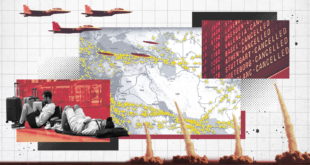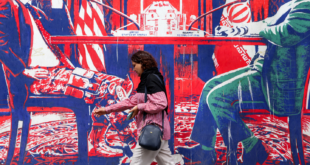VIENNA (AP) — Europe’s success in cajoling Iran to stick with negotiations meant to reduce Tehran’s potential for nuclear mischief is only one skirmish won in a high stakes diplomatic battle.
A decision Wednesday at a meeting of European foreign ministers and a top Iranian representative to keep talking defused the immediate threat that Iran would resume programmes capable of producing nuclear weapons.
But diplomats and officials familiar with what was discussed say the two sides did little more at the Geneva meeting than agree to keep the talks afloat for the next two months.
“The idea is that the process will continue,” said one of the officials, acknowledging that no progress was made on the key dispute in the six-month talks — Iran’s insistence on the right to enrich uranium and European opposition to such plans.
“Yesterday we didn’t go into substance, we entered mainly into methodology,” said another official, who, like her colleague, demanded anonymity because of the sensitivity of the closed-door talks. She told The Associated Press that Iran’s demand that it be allowed to enrich uranium “remains unacceptable” to France, Britain and Germany, negotiating for the European Union.
The impasse over enrichment thus still threatens to scuttle the talks when they resume in the summer because Iran insists that nothing the Europeans could offer would make it give up the right to enrichment.
But for now, Iran’s decision to keep talking gives it concrete benefits — most immediately, agreement by members of the World Trade Organisation on Thursday to start membership talks for the Islamic republic.
The United States, which repeatedly had blocked Iran’s long-held desire to join the WTO, raised no objections. The 148-member WTO takes such decisions by consensus.
The Americans “had positive instructions from their capital” on Iran’s WTO ambitions that were directly linked to Tehran’s decision to continue talks with the Europeans, said one of the officials. Less tangible — but potentially even more important to Iran — is the potential good will created by its decision to stick with the talks just weeks ahead of a key meeting of the UN nuclear watchdog agency that will pass judgement on Tehran’s nuclear record.
A breakdown of the EU-Iran talks would have fed US hopes of having the June 13 board meeting of the International Atomic Energy Agency refer Tehran to the UN Security Council for nuclear activities that Washington insists show an attempt to build weapons.
IAEA spokesman Mark Gwozdecky on Thursday welcomed Iran’s decision to keep talking with the Europeans, saying the result of a continued freeze by Tehran of enrichment “is an important part of the confidence building process.” But Iran had few other options. Despite public bravado, it fears the threat of Security Council action; its decision to refrain from resuming some enrichment-linked activities came only after warnings by the three European powers that they would support such US efforts. Now it is expected to exploit its decision to continue talks as a way to blunt dissatisfaction with foot-dragging on other nuclear fronts. A senior diplomat familiar with the latest details of a three-year IAEA probe into Iran’s nuclear dossier told the AP that Tehran has refused all of the agency’s major requests since the last board meeting in March.
These include IAEA calls: — to ratify an agreement that would give the agency added clout in its nuclear probe — for renewed access to Parchin, a military site where the United States says Iran may be testing high-explosive components for nuclear weapons.
— to stop construction of a heavy water reactor — suitable for extracting plutonium for weapons use — at the city of Arak — to submit fresh information on imported “dual use” components and equipment that can have civilian or nuclear weapons applications — to provide expanded documentation on centrifuge components used to enrich uranium, as part of an agency investigation on whether they were meant to produce material weapons use or for energy, as Iran claims.
— for more information meant to help the agency determine the origin — domestic or imported — of weapons grade uranium traces on centrifuges bought on the nuclear black market.
Some help on the last issue is being provided by Pakistan. Diplomats told the AP Thursday that the IAEA had received centrifuge components a day earlier from Islamabad for testing that could help agency experts determine whether the traces of highly enriched uranium came in on black market equipment originating from Pakistan or was a result of activities within Iran.
“Testing and analysis of the [Pakistani] samples is under way,” said Gwozdecky, refusing further details.
 Eurasia Press & News
Eurasia Press & News


